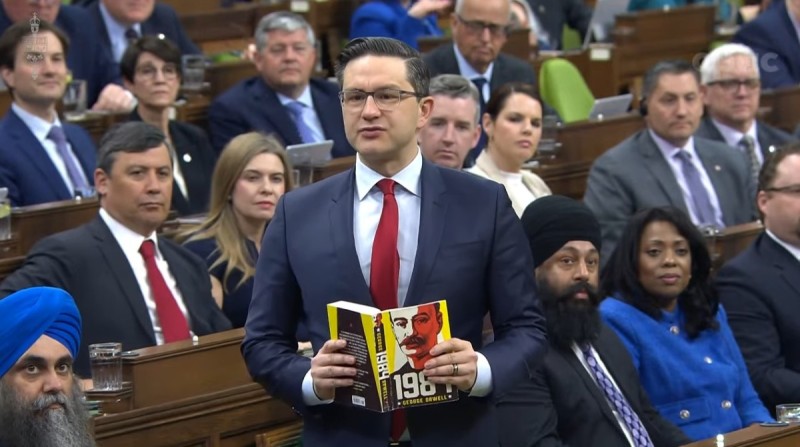Conservatives find that proposing media reform is a dangerous minefield
The Opposition could reveal themselves as dangerous amateurs with too many missteps

Pierre Poilievre holds George Orwell’s dystopian novel Nineteen Eighty-Four as a prop during Question Period, March 30, 2023. Photo courtesy CPAC.
It isn’t even Labour Day yet and federal Conservatives are already hot on the campaign trail like they’ve been shot out of a cannon for an election that might not come for more than a year. At the rate they’re going, the race could end up like the fabled contest of Tortoise v. Hare. The danger is that with time, the Opposition could reveal themselves as dangerous amateurs with too many missteps like last week’s labelling of the Sudbury Holiday Inn, where Prime Minister Justin Trudeau joined a caucus of Ontario Liberals, as “lavish” and “swanky.” Such exaggeration rightly earned the Tories much teasing on social media.
One thing that is already apparent is that the Conservatives intend to make the media a major election issue this time around, unlike in 2021, when it never really came up under then-leader Erin O’Toole despite a promise in the party’s platform to end the $595 million media bailout, which the Trudeau Liberals had passed two years earlier. The bailout was recently extended for another five years until 2029, and its maximum payout was more than doubled from $13,750 per worker to $29,750. Then there’s the disastrous Online News Act, which was pushed through by the ruling Liberal-NDP coalition last year in an attempt to force Google and Meta to pay an estimated $329 million a year to Canadian news media. It backfired badly when Meta instead dropped news in Canada on its Facebook and Instagram platforms, depriving small publishers of its valuable free distribution, although Google has promised to pay $100 million a year.
Suffice it to say that the Liberals have thoroughly messed up Canada’s media, which leaves them wide open to attack by the Conservatives on this front. All the Opposition needs do to score some major gains is not screw up too badly. Unfortunately for them, they seem to be botching the job already. The party has made no secret of its plans to defund the CBC if it comes to power, which has well-entrenched cultural protectionists gearing up for battle. The Conservatives might find they have bitten off more than they can chew if they go too far down this road.
Rachael Thomas, the party’s Shadow Minister for Canadian Heritage, has been campaigning hard for CBC executives to be hauled up before MPs for yet a third time over their bonuses, which reportedly average $73,000 this year. “While Canadians struggle to afford basic necessities like food and rent, CBC executives are rewarding themselves with massive bonuses despite their failing performance,” she tweeted recently. “End the madness.” The bonuses are far from “massive” and are instead modest when compared to those given out in private media companies, where senior executives are routinely awarded bonuses in the millions despite making thousands of layoffs. This avenue of attack could well turn into another Holiday Inn for the Tories.
Then there’s new party leader Pierre Poilievre, who has had a prickly relationship with reporters so far, seemingly taking a page out of Donald Trump’s playbook of attacking the messenger. He bashed Trudeau’s record on media during a visit to Niagara-on-the-Lake last week. “It is terrible … how local journalism has done under nine years of Trudeau,” he told local newspaper The Lake Report. “He’s tried to take it over and basically wants everyone to work for the government so that he can have regurgitated propaganda paid for by taxpayers.” Asked what he would do differently if elected, Poilievre quickly changed the subject and served up yet another Holiday Inn moment. “I am looking into it. But more important than that, the question is how do we bring back free speech,” he said. “The answer is journalists getting eyeballs so they can sell subscriptions and advertising, get sponsorships and do what media have done for, I don’t know, 3,000 years.” He was only off by a factor of 10, as newspapers didn’t start appearing until the 17th century in Europe and were mostly supported by political parties until the 19th century, when advertising began to emerge. This misstep is reminiscent of former Alliance Party leader Stockwell Day, who believed as a fundamentalist Christian that dinosaurs roamed the earth with humans.
Poilievre soon began veering into conspiracy theory territory. “We can’t have the government try to shut down the competition just to favour those who favour the political viewpoint of Justin Trudeau,” he told the free weekly, which has been publishing since 2018 and is chock full of ads, especially for real estate. The newspaper, which receives federal subsidies including a fully-paid reporter under the Local Journalism Initiative intended to help cover under-served communities, curiously left Poilievre’s best quotes for a full-page editorial that savaged him for “pandering, lying and misleading.” The Conservative leader was “spinning webs of lies that sound, to the ill-informed, like truth,” railed the editorial written by Lake Report editor and co-owner Richard Harley, whose real name is Harley Davidson. “The notion that any legitimate newspaper would simply print ‘propaganda’ for any party is ludicrous.”
Poilievre’s most questionable claim came when he was asked what his party would do to support local journalism. “I am going to repeal the censorship laws, make it possible for Canadian news to be visible again on Facebook, Instagram and all other social media platforms,” he said. “And get rid of the terrible censorship laws that have taken those news stories down from the internet and deprived independent local media to have a voice.” His claims that Canadians lack freedom of speech and suffer from censorship rightly received rebuke from The Lake Report editor. “In Canada we already have freedom of expression thanks to the Charter of Rights,” pointed out Davidson. “The only ‘censorship’ being done is solely by Meta. He’s being blatantly misleading.”
The editorial sparked controversy after it was tweeted out by half the Liberal cabinet in an obvious attempt to cash in on Poilievre’s exaggerations and mischaracterizations. Deputy Prime Minister and Finance Minister Chrystia Freeland tweeted that the editorial was “exactly why local journalism matters.” That earned her a swift rebuke from Conservative MP Michael Chong, who pointed out that as a former journalist, “she should know better” than to praise journalists subsidized by her government for criticizing a political opponent.
J-source, a journalism website published at Toronto Metropolitan University, noted that the kerfuffle had “ignited a late-summer conversation about the state of journalism in the country.” It reprinted the editorial, claiming that “in recalling Poilievre’s contradictory and misleading answers to the journalist’s questions, Harley’s piece shows that discussions about the future of journalism are happening in a misinformation-filled space.”
These controversies show that media reform in Canada will indeed be a hot-button issue in the next election, but it is a minefield that both parties will have to step carefully on.
Marc Edge is a journalism researcher and author who lives in Ladysmith, BC. His books and articles can be found online at www.marcedge.com.










